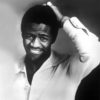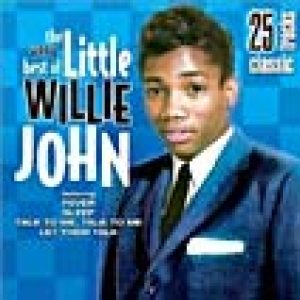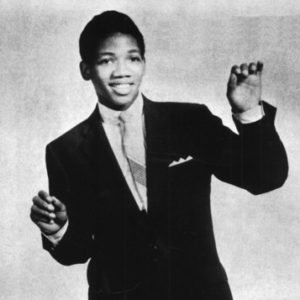calsfoundation@cals.org
"Little Willie" John (1937–1968)
aka: William Edgar John
William Edgar “Little Willie” John was a powerful rhythm and blues vocalist and songwriter who recorded several hit songs, including the original version of “Fever” at age eighteen.
Little Willie John was born on November 15, 1937, in Cullendale (Ouachita County). He was one of ten children. His father, Mertis, was a logger in northern Louisiana and southern Arkansas; his mother, Lillie, played guitar and sang gospel songs, teaching them to her children. His sister Mable, also raised in Ouachita County, recorded as a Raelette for Ray Charles and solo for Stax Records.
In 1942, the Johns moved to Detroit, Michigan, so Mertis could pursue factory work. The eldest children, including Willie, formed a gospel quintet in the 1940s. A powerful and emotive vocalist, the teenaged John also gained notice singing at solo amateur shows—including the attention of performer Johnnie Otis, who reportedly tried to get him a recording contract but was turned away because John was too young.
Producer, musician, and arranger Henry Glover of Hot Springs (Garland County) signed John to King Records in June 1955 after encountering him in New York City when John was seventeen. Nicknamed “Little Willie” due to his short stature, John also had a short temper and considerable insecurity about his height—all made worse by his propensity to abuse alcohol. After a brief tenure with the Paul “Hucklebuck” Williams orchestra, John was dumped for misbehavior. Glover, who produced country, R&B, and rock hits and wrote such songs as “Drown in My Own Tears” and “California Sun,” said he first heard John sing one day at 5:00 p.m.; he was so impressed that they were in the studio recording by 8:00 p.m.
John recorded a version of “All Around the World” the day the original Titus Turner version was released. His debut reached R&B’s top five in 1955, and John’s follow-ups charted at fifth and sixth—including one written by his brother Mertis Jr. When he was barely eighteen, John cut the first version of the evergreen “Fever” in Cincinnati, Ohio, on March 1, 1956, with Glover producing.
Through the late 1950s and early 1960s, John kept charting songs—1959’s “Let Them Talk,” 1960’s “Sleep,” 1961’s “Take My Love.” But increasing alcoholism and weakening sales caused King Records to drop him by the fall of 1963. He hit the club circuit without a recording contract, although King continued to issue his material from its vaults.
John was arrested in Miami, Florida (where he had moved probably in 1957 or 1958), for attacking a man with a broken bottle in August 1964. That same month, the Beatles cut several versions of their club favorites for the band’s rushed Beatles for Sale sessions—including “Leave My Kitten Alone,” a 1959 R&B and pop charter for John that charted again with its reissue in December 1960. But the song, co-written by John, was ultimately left off the Beatles album.
In October 1964, John killed a man at an after-hours party in Seattle, Washington. The man had apparently taken a chair from one of the women accompanying John. John confronted the man, who promptly punched him. In retaliation, John rose with a knife and stabbed the man.
Then twenty-six years old, he was charged with murder. He posted $10,000 bond and continued touring, returning for trial in 1965. Convicted of manslaughter, he began serving his eight- to twenty-year sentence at Walla Walla State Penitentiary on July 6, 1966. He died nearly two years later, on May 26, 1968, in the maximum security facility. Rumors of prison beatings or other foul play have always surrounded his death.
After John’s death, one-time opening act James Brown recorded a tribute album, Thinking of Little Willie John and a Few Nice Things. Brown had since signed with John’s former label and become its biggest artist.
Johnnie Taylor of Crawfordsville (Crittenden County) was among the many R&B singers who later performed John’s songs, including John’s sister Mable.
In rock and roll, Phillips County native Levon Helm and Robbie Robertson of the Band are among those who have acknowledged John’s influence. Robertson said John “opened up a door to something for me,” and when he coordinated The Color of Money film soundtrack, he asked British rocker Robert Palmer to contribute to the project a version of John’s overlooked 1963 rumba, “My Baby’s in Love with Another Guy.” Robertson also references John in his minor 1987 hit, “Somewhere Down the Crazy River.” Retro-rockers the Blasters covered another obscure John single, 1960’s “I’m Shakin’,” and the Allman Brothers recorded a version of “Need Your Love So Bad.” And from Peggy Lee to Madonna, the song “Fever” lives on through countless versions, but John’s haunting, tortured vocals have yet to be replicated. He left a brief but profound musical legacy.
For additional information:
Bowman, Rob. Soulsville, U.S.A.: The Story of Stax Records. New York: Schirmer Books, 1997.
Hoffman, Steve. “Little Willie John.” Encyclopedia of the Blues. New York: Routledge, 2005.
Koch, Stephen. “Big Voice, Big Hits, Big Trouble.” Arkansas Democrat-Gazette, September 19, 1999, pp. 1E–2E.
Stephen Koch
“Arkansongs”
 Music and Musicians
Music and Musicians World War II through the Faubus Era, 1941 through 1967
World War II through the Faubus Era, 1941 through 1967 "Fever," Performed by "Little Willie" John
"Fever," Performed by "Little Willie" John  "Little Willie" John
"Little Willie" John 




Comments
No comments on this entry yet.